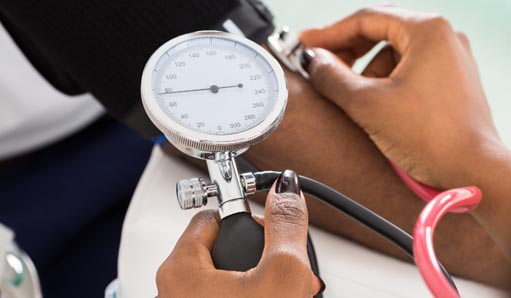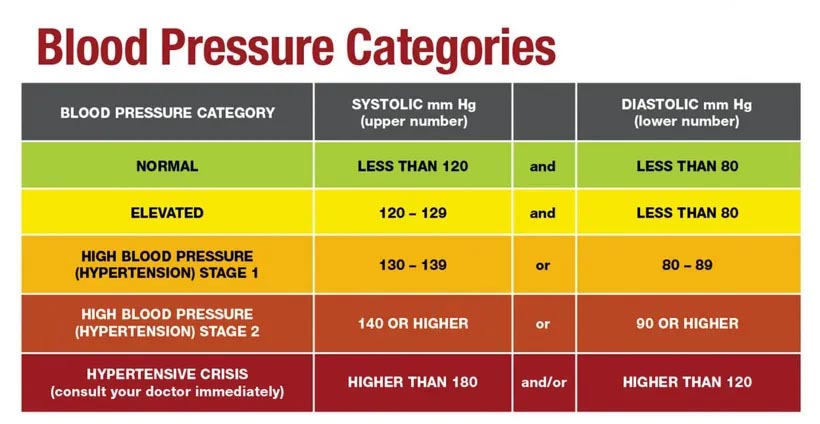
- By BlueBC_Admin
- In News
Major Causes of Hypertension And High Blood Pressure
 High blood pressure is also referred to as hypertension in some circles. It can lead to significant health consequences and raise the risk of heart disease, stroke, and sometimes death.
High blood pressure is also referred to as hypertension in some circles. It can lead to significant health consequences and raise the risk of heart disease, stroke, and sometimes death.
The force that a person’s blood exerts on the lining of their blood vessels is called their blood pressure. This pressure is determined by the resistance of the blood arteries and the amount of effort required of the heart.
A significant contributor to the development of cardiovascular diseases, such as stroke, heart attack, heart failure, and aneurysm, is high blood pressure, often known as hypertension. Controlling one’s blood pressure is necessary to maintain one’s health and lower vulnerability to these potentially fatal illnesses.
How is High Blood Pressure Diagnosed?
Your healthcare professional will need to use a blood pressure cuff to check your blood pressure because high blood pressure does not have any symptoms. Your blood pressure is typically checked at each annual checkup or appointment with a provider. Your healthcare practitioner may diagnose you with high blood pressure if you have readings consistently high at two or more appointments.
What Causes High Blood Pressure or Hypertension?
Numerous factors have the potential to influence your blood pressure. You may have power over some of them but not others. When multiple risk factors come together, hypertension is almost always the result. This accounts for 95% of the time. Many people may have the same risk factors, but their blood pressure can react differently. Only around five percent of patients have a single medical cause that can be pinpointed and treated.
Major Causes Of Hypertension And Blood Pressure
In many cases, the reason behind hypertension is a mystery. In many instances, it can be traced back to a more fundamental health problem.
Primary hypertension, also known as essential hypertension, refers to high blood pressure not caused by any other illness or disease. The term “secondary hypertension” refers to the situation where an underlying condition is the root cause of elevated blood pressure.
- Primary hypertension
It can be caused by a variety of conditions, including the following:
- being overweight and having insulin resistance
- excessive amounts of salt intake, excessive amounts of alcohol consumption.
- having a lifestyle characterized by inactivity and smoking.
- Secondary hypertension
It is a particular condition that results from a preexisting medical issue and has its unique causes.
- Other Major Causes
Genetics
There is evidence that certain genes in your DNA are connected to an increased likelihood of developing hypertension. Knowing one’s family history is essential, even though it is very little we can do to alter our genetic make-up. If other people in your family have hypertension, there is a possibility that you will also have it. There are also some physical disorders that you may be born with, which might cause your blood pressure to be higher than normal. These conditions are typically identified during a person’s childhood and involve issues with the aorta and many other blood vessels.
Eating too much sodium.
The average person consumes excessive salt, also known as sodium chloride. And consuming an excessive amount of it throughout your diet may increase the likelihood that you may develop hypertension. The highest salt concentrations can be found in prepared dishes and restaurant fare. The most recent recommendation is a daily intake of fewer than 2300 mg of sodium. Even a little reduction of 1000 mg can bring about significant improvements in health.
This is because consuming excessive salt might increase your risk of having a stroke, as well as other health problems.
High blood sugar
Diabetes, often known as high blood sugar, is another risk factor that affects blood pressure that is not as pronounced. The American Heart Association did not include it on its list of risk factors because of this reason. Despite this, there is compelling evidence to suggest that having persistently high blood sugar puts a person at an increased risk of hypertension later in life.
 Bottom Line
Bottom Line
Hypertension is a condition; it is important to maintain regular follow-up appointments with your primary care physician. It is critical to check for conditions that can be treated and impact one’s blood pressure. Most of the time, hypertension may be traced back to different risk factors. If it is not addressed, it can result in serious complications.






